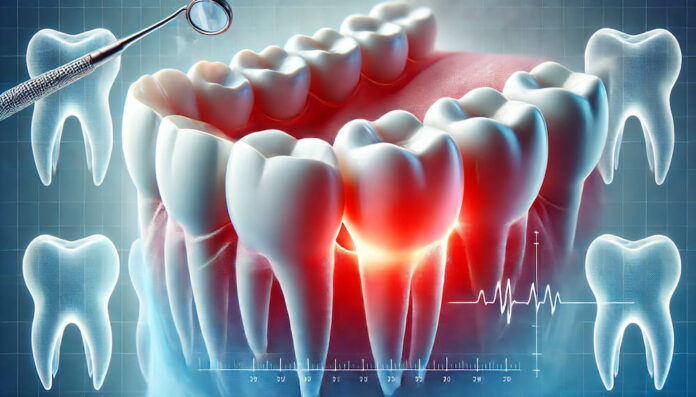Dental crowns are common restorative treatments used to restore teeth that are damaged or decayed. While crowns are designed to be durable and long-lasting, some patients experience discomfort or pain after getting one. If you’re wondering, “Why does my crown hurt?” you’re not alone. Pain after a crown procedure can stem from a variety of reasons. Understanding the potential causes and how to address them can help ease your discomfort and protect your oral health.
In this article, we’ll explore common reasons why crowns may cause pain and what you can do to relieve it. If you’re experiencing persistent pain, it’s always a good idea to visit a family dentist in Arlington, VA, such as Bloom Dental of Arlington, for expert care and advice.
Common Reasons Why a Crown Might Hurt
Tooth Sensitivity After the Procedure
It’s normal to experience some sensitivity after getting a crown, especially if the tooth had extensive decay or damage before the procedure. The tooth underneath the crown may still be healing, and this can cause temporary discomfort or sensitivity to hot, cold, or sweet foods.
Solution: Sensitivity usually resolves after a few days to a week. If the discomfort persists, it’s important to visit your dentist to check if the issue is more serious.
Crown Does Not Fit Properly
A crown that doesn’t fit properly can cause pain by exerting pressure on surrounding teeth or the underlying gum tissue. If the crown is too high, it can lead to discomfort when chewing or biting down, as the force is not evenly distributed.
Solution: If you suspect your crown doesn’t fit right, contact your dentist. They can adjust the crown to ensure proper fit and eliminate the pressure that is causing the pain.
Gum Irritation or Infection
After a crown is placed, the gums around the tooth can become irritated. If the crown edge is too rough or too high, it can rub against the gums, causing discomfort. In some cases, infection may develop under the crown, leading to pain and swelling.
Solution: Rinsing with salt water can help soothe mild irritation. If infection is suspected, you should seek dental care right away. Your dentist may need to remove the crown to address the infection and ensure proper healing.
Underlying Tooth Decay or Damage
If the tooth underneath the crown wasn’t adequately treated for decay or damage before the crown was placed, the infection or damage could continue to spread. This can lead to pain and discomfort even after the crown is put in place.
Solution: A thorough examination by your dentist will help determine if there is underlying tooth decay. In some cases, a root canal treatment may be necessary to resolve the issue before a new crown is placed.
Cracked or Damaged Crown
Over time, a crown can crack or become damaged due to wear and tear, trauma, or biting down on hard objects. A cracked crown can expose the underlying tooth, causing pain when chewing or biting.
Solution: If your crown is cracked or chipped, contact your dentist for a replacement or repair. It’s important to avoid chewing on hard foods to prevent further damage.
Nerve Damage or Inflammation
During the placement of a crown, the nerve inside the tooth can sometimes become inflamed, particularly if the procedure involved a significant amount of drilling or if the tooth was heavily decayed. This inflammation can cause prolonged pain and sensitivity.
Solution: If you suspect nerve involvement, your dentist may recommend a root canal treatment to remove the inflamed nerve tissue and prevent further pain.
When to Visit Your Dentist
If your crown is causing persistent pain, it’s important to schedule an appointment with your dentist. A family dentist in Arlington, VA, such as Bloom Dental of Arlington, can evaluate the issue and determine the exact cause of your discomfort. They will conduct a thorough examination, which may include X-rays, to diagnose the problem and recommend the appropriate treatment.
It’s especially important to seek dental care if you experience any of the following symptoms:
– Severe pain that lasts more than a few days
– Swelling or redness around the crown
– Difficulty chewing or biting down
– Fever or signs of infection
Preventing Pain from Crowns
While pain after a crown procedure is not uncommon, there are steps you can take to reduce the likelihood of experiencing discomfort:
– Follow Post-Op Care Instructions: After getting a crown, your dentist will provide care instructions. Following these carefully can help avoid complications like irritation or sensitivity.
– Avoid Hard Foods: Immediately after the crown is placed, avoid chewing on hard foods that could put pressure on the crown or cause it to crack.
– Maintain Good Oral Hygiene: Keeping your mouth clean by brushing and flossing regularly can prevent gum irritation and tooth decay, which can lead to crown discomfort.
– Visit Your Dentist Regularly: Regular checkups will help ensure that your crown is still in good condition and that there are no underlying issues.
Conclusion
Experiencing discomfort after getting a crown is not uncommon, but it’s essential to identify the cause of the pain and seek appropriate treatment. Whether it’s due to tooth sensitivity, improper fit, or an underlying issue, a family dentist in Arlington, VA, such as Bloom Dental of Arlington, can help you address the problem and relieve the discomfort. If you’re dealing with persistent pain, don’t hesitate to schedule an appointment to ensure that your crown is working as it should.
By maintaining regular dental checkups and following your dentist’s care instructions, you can enjoy the long-lasting benefits of your crown without the pain.
Did you find this helpful? Check out our other helpful articles on our website.
Read Also
- How to Find a 5-Star Dentist Near YouChoosing a dentist is more than just finding someone who can clean your teeth. It’s about selecting a trusted partner in your long-term oral health. A 5-star dentist not only provides excellent clinical care but also delivers a positive patient experience, from the moment you walk in until the moment you leave. Whether you’re new… Read more: How to Find a 5-Star Dentist Near You
- Your Easy-Peasy Guide to Brewing Amazing MatchaHey there! So, you’ve heard all the buzz about matcha – that vibrant green powder that’s not just pretty but packed with good stuff? It can seem a little fancy and intimidating at first, but trust me, making a delicious cup at home is simpler than you think. Forget complicated ceremonies for now; let’s just… Read more: Your Easy-Peasy Guide to Brewing Amazing Matcha
- Embracing Holistic Wellness: Insights from a Lansing, MI Health CenterReframing Health: Moving Beyond Symptom Management Treating only symptoms often offers quick relief, yet long-term results stay out of reach. When care zeroes in on isolated complaints, the bigger picture, such as stress, behavior, or lifestyle, often gets missed. Research shows that whole-person care, which looks at physical, emotional, and environmental factors, yields better outcomes… Read more: Embracing Holistic Wellness: Insights from a Lansing, MI Health Center
- VO₂ Max Testing Explained: What It Is & Why It Matters for Your HealthVO₂ max sounds like a term reserved for elite athletes, but it’s among the most accurate measures of your lifetime and general condition. Moreover, it goes beyond performance. Monitoring your VO₂ max will help you to ascertain your body’s capacity to control stress, its oxygen consumption efficiency, and your internal ageing process. If you have… Read more: VO₂ Max Testing Explained: What It Is & Why It Matters for Your Health
- So, what exactly is matcha?Think of matcha as green tea turned up to eleven! Instead of steeping leaves and tossing them out, matcha is made by grinding whole green tea leaves into this super-fine, vibrant green powder. You whisk it right into hot water (or milk!), meaning you’re drinking the entire leaf. That’s why folks say you get way… Read more: So, what exactly is matcha?
- How to Tell When It’s Time for Professional Senior Care SupportCaring for an aging loved one is a journey filled with love, patience, and difficult decisions. One of the toughest choices families face is knowing when it’s time to seek extra help. In this article, trusted Los Angeles caregivers for seniors explore the signs that it might be time to bring in professional support, not… Read more: How to Tell When It’s Time for Professional Senior Care Support
- Reporting a Work Injury: What Deadlines You Need to KnowAfter a workplace injury, time isn’t always on your side. Many employees aren’t aware that there are strict deadlines for reporting a work-related injury, and missing that window can put your entire claim at risk. Whether your injury was sudden or developed gradually over time, it’s essential to act quickly and follow the proper steps.… Read more: Reporting a Work Injury: What Deadlines You Need to Know
- How All-on-4 Can Transform Your Smile (and Confidence)If you’ve been living with missing teeth, uncomfortable dentures, or declining oral health, you know how much it can affect your self-esteem. All-on-4 dental implants offer more than just a full set of teeth — they offer a renewed sense of confidence and quality of life. With a streamlined treatment process and reliable, long-term results,… Read more: How All-on-4 Can Transform Your Smile (and Confidence)









